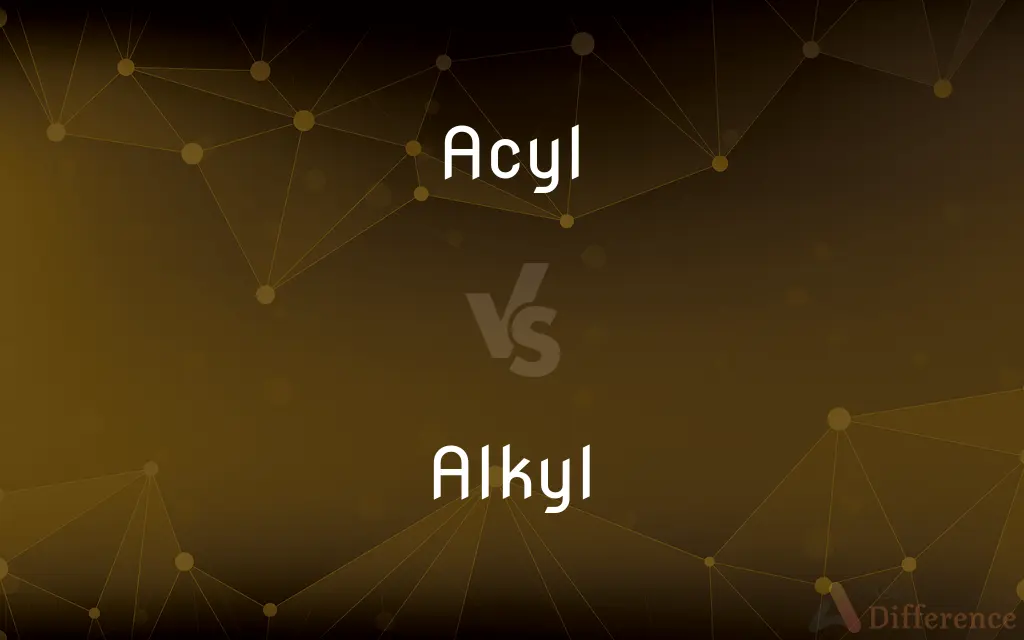Acyl vs. Alkyl — What's the Difference?
By Tayyaba Rehman & Maham Liaqat — Updated on April 16, 2024
Acyl groups contain a carbon-oxygen double bond and are derived from acids, while alkyl groups are saturated hydrocarbon chains.

Difference Between Acyl and Alkyl
Table of Contents
ADVERTISEMENT
Key Differences
Acyl groups are characterized by the presence of a carbonyl group (C=O) attached to a carbon chain or ring, making them reactive at the carbonyl carbon. Alkyl groups, on the other hand, consist of carbon and hydrogen atoms arranged in a branching or straight chain without any double bonds.
In organic chemistry, acyl compounds are often involved in reactions that utilize their carbonyl group, such as acylation reactions. Alkyl groups, whereas, are typically involved in reactions like substitutions or additions where the saturation of the hydrocarbon plays a role.
The stability of acyl groups is influenced by the electron-withdrawing effect of the oxygen in the carbonyl group, which can stabilize the positive charge. Alkyl groups are generally more stable due to their saturated nature and lack of polar bonds.
Functional derivatives of acyl groups include acyl chlorides and esters, which are commonly used in organic synthesis. Alkyl groups, on the other hand, form compounds like alkanes and haloalkanes.
In biological systems, acyl groups are part of various biomolecules, such as acyl-CoA, crucial for metabolic processes. Alkyl groups contribute to the hydrophobic components of larger molecules like lipids and waxes.
ADVERTISEMENT
Comparison Chart
Composition
Contains a carbonyl group (C=O)
Consists of only C and H atoms
Bonding
Carbon linked to an oxygen atom
Carbon linked to other C or H
Derivatives
Acyl halides, esters, amides
Alkanes, haloalkanes, alkenes
Stability
Less stable due to reactive carbonyl
More stable, non-polar
Common Reactions
Acylation, nucleophilic addition
Substitution, radical reactions
Compare with Definitions
Acyl
A functional group derived from an acid by removal of a hydroxyl group.
Acetyl chloride is a common acyl compound used in acylation.
Alkyl
A saturated hydrocarbon chain.
Methyl groups are the simplest alkyl chains.
Acyl
Commonly forms acyl-CoA in metabolism.
Acyl-CoA plays a crucial role in fat metabolism.
Alkyl
Generally non-reactive in nature.
Alkyl groups in waxes protect plant leaves.
Acyl
Contains a carbonyl group attached to a radical.
Benzoyl peroxide is used in acne treatments.
Alkyl
Found in alkanes with single bonds only.
Butane, a four-carbon alkane, consists of alkyl groups.
Acyl
Involved in peptide bond formation.
Acyl groups form the backbone of many proteins.
Alkyl
Does not contain a carbonyl group.
Ethyl groups are used to form ethane.
Acyl
Reacts through the carbonyl carbon.
Acyl chlorides react with water to produce acids.
Alkyl
Involved in radical reactions.
Alkyl radicals are intermediates in combustion.
Acyl
An organic group having the general formula RCO-, derived from an organic acid.
Alkyl
In organic chemistry, an alkyl substituent is an alkane missing one hydrogen. The term alkyl is intentionally unspecific to include many possible substitutions.
Acyl
(organic chemistry) Any of class of organic radicals, RCO-, formed by the removal of a hydroxyl group from a carboxylic acid.
Alkyl
A univalent group, such as ethyl or propyl, having the general formula CnH2n+1.
Acyl
An acid radical, as acetyl, malonyl, or benzoyl. An acyl radical can be depicted as R-CO-, where -CO- is the carbonyl group, and R is the group that characterizes the acyl moiety.
Alkyl
(organic chemistry) Any of a series of univalent radicals of the general formula CnH2n+1 derived from aliphatic hydrocarbons.
Acyl
Any group or radical of the form RCO- where R is an organic group;
An example of the acyl group is the acetyl group
Alkyl
Any of a series of univalent groups of the general formula CnH2n+1 derived from aliphatic hydrocarbons
Common Curiosities
What is the primary structural difference between acyl and alkyl groups?
Acyl groups contain a carbonyl group, whereas alkyl groups are made up of only carbon and hydrogen atoms.
What role do acyl groups play in metabolism?
Acyl groups are crucial in metabolic processes, particularly in the formation of acyl-CoA, which is involved in fat metabolism.
Are alkyl groups found in biological systems?
Yes, alkyl groups are part of many biological molecules, contributing mainly to the hydrophobic parts like lipids.
How do the reactivities of acyl and alkyl groups differ?
Acyl groups are more reactive due to the presence of the carbonyl group, facilitating various chemical reactions; alkyl groups are comparatively less reactive.
Can both acyl and alkyl groups form chains?
Yes, both can form carbon chains, but acyl groups also contain oxygen in the carbonyl group.
How do acyl and alkyl groups react in organic synthesis?
Acyl groups are reactive at the carbonyl carbon, often involved in acylation reactions; alkyl groups typically participate in substitutions.
Can acyl groups form stable compounds?
Yes, acyl groups can form stable compounds like esters and amides, although they are generally less stable than alkyl derivatives.
What are some common uses of alkyl groups in industry?
Alkyl groups are used in the production of polymers, lubricants, and as intermediates in various chemical reactions.
How are acyl and alkyl groups involved in drug synthesis?
Acyl groups are used to modify the properties of drugs, enhancing their activity or stability; alkyl groups are used to increase hydrophobicity or alter molecular structure.
Are acyl and alkyl groups polar?
Acyl groups are polar due to the presence of a carbonyl group, while alkyl groups are non-polar.
Share Your Discovery

Previous Comparison
Zoopsychological vs. Zoopsychology
Next Comparison
Holophytic vs. NutritionAuthor Spotlight
Written by
Tayyaba RehmanTayyaba Rehman is a distinguished writer, currently serving as a primary contributor to askdifference.com. As a researcher in semantics and etymology, Tayyaba's passion for the complexity of languages and their distinctions has found a perfect home on the platform. Tayyaba delves into the intricacies of language, distinguishing between commonly confused words and phrases, thereby providing clarity for readers worldwide.
Co-written by
Maham Liaqat














































